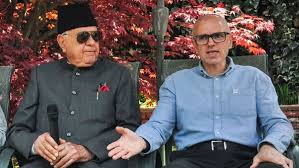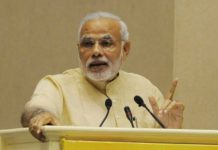Five years after the revocation of Article 370, that granted special status to J&K, the old political order and its narrative which the BJP tried hard to displace, stays unchanged. This is a setback to the BJP’s efforts to set up a parallel political structure in the Valley. A report by Riyaz Wani

But for the unexpected victory of Engineer Rashid in North Kashmir’s Kupwara constituency, the poll outcome in Jammu and Kashmir was more or less along the expected lines. The National Conference and the BJP won two each in the four remaining seats. In Ladakh, it was the independent candidate Haji Hanifa Jan who eventually won.
If the election was presumed to be a referendum on the acceptance or rejection of the abrogation of J&K’s special status as the mainstream parties like National Conference and the PDP framed it, the verdict in the Valley was clearly against it. More so, in Kupwara, where Rashid’s Awami Ittehad Party (AIP) has adopted a more hardline approach on the issue. Rashid himself has been in jail since 2019. In August 2019, soon after the abrogation of Article 370, he was arrested by the National Investigation Agency (NIA) in a case of terror funding. The incarceration brought him a wave of sympathy during a spirited campaign led by his sons Abrar Rashid and Asrar Rashid. Theirs was a wild card entry at a time when the contest seemed to be evenly split between the former chief minister Omar Abdullah and the People’s conference chief Sajjad Lone. They were considered the only serious candidates in the fray. But Rashid polled a whopping 4,54,950 votes, 46 percent of the total votes in the constituency.
The victory may not help Rashid come out of jail but it has made him a far bigger leader in the Valley than he has been so far. Rashid has won two successive Assembly elections from his small constituency Langate, He also fought 2019 parliamentary polls, and polled over one lakh votes which too was a surprise at the time. This time, he has not just got over 3 lakh more votes but these votes are spread across the North Kashmir, giving him a solid foothold in several Assembly constituencies. North Kashmir has around 16 Assembly constituencies, which makes Rashid a force to reckon with in a future Assembly election and a potential kingmaker in a future government if the current wave persists in his favour. And such a prospect looks likely considering Assembly polls are expected to be held by September this year.
Meanwhile, Engineer Rashid has approached Delhi’s Patiala House Court seeking interim bail to take oath as a member of parliament (MP).
Other battles
In Srinagar constituency, the NC candidate Aga Syed Ruhullah Mehdi polled 3,56,866 votes as against his nearest competitor 1,68,450 by the PDP candidate Waheed ur Rehman Parra. Similarly in Anantnag constituency, Mian Altaf polled 5,21,836 votes while former Chief Minister Mufti bagged 2,40,042 votes.
Jammu and Kashmir, in all, recorded a voter turnout of 58.58 percent in the election. In a statement on May 27, the CEC said the voter turnout was the highest in 35 years and there had been a 23 percent increase in the number of candidates compared to 2019.
One big takeaway from the election was that the candidates who were seen as close to the BJP lost big. For example, Apni Party candidate in Srinagar, Mohammad Ashraf Mir polled just over 65,000 votes and its Anantnag constituency candidate Zafar Iqbal Manhas got 1,42,195 votes. In North Kashmir, Lone’s People’s Conference, otherwise an established party, also lost a substantial chunk of its public support for being perceived as close to the saffron party.
This is a setback to the BJP’s efforts over the past five years to set up a parallel political structure that takes on the established parties such as the NC and the PDP. Five years after the revocation of Article 370, which granted special status to J&K, the old political order and its narrative which the BJP tried hard to displace, stays unchanged. And by electing Rashid, who champions a hardline mainstream politics that seeks constitutional safeguards for Kashmir, the Valley has once again conveyed its unhappiness over the loss of its special constitutional status.
In fact, during the election campaign, the accusation of being pro-BJP became a slur which opponents liberally used against one another. The BJP, however, did not contest in the Valley. Parties like the NC and the PDP attributed this to the saffron party supporting candidates from its alleged proxy parties, such as the Apni Party and the People’s Conference. As it turned out, none of them won.
But, will the BJP again fight through its alleged proxies in the Assembly elections? It may not be the case. The BJP leader and the former Union Home Minister Amit Shah announced during his recent visit to Srinagar in the middle of elections that the party intended to compete for all 90 seats in the assembly elections.
Assembly elections in sight?
Beginning preparations for the Assembly elections, the Election Commission (EC) announced on June 7 that it will start accepting applications from political parties for the use of common symbols for their candidates.
“The Commission has decided to accept applications seeking allotment of Common Symbol under Para 10B of the Election Symbols (Reservation & Allotment) Order, 1968 for the General Election to the Legislative Assembly of Union Territory of Jammu & Kashmir with immediate effect,” stated the EC.
Last year, the Supreme Court directed the EC to conduct the J&K Assembly elections by September 30. This ruling came alongside the Court’s upholding of the August 5, 2019, abrogation of Article 370, which resulted in the division of the former state into two Union Territories.
A Delimitation Commission was established in 2020 to redefine the boundaries of the Lok Sabha and Assembly constituencies. The delimitation order, issued in May 2022, established a 90-member Assembly, allocating 47 seats to Kashmir and 43 to Jammu.
This has effectively paved the way for the Assembly polls in J&K. And this time, the people are more hopeful of the elections being held due to the altered nature of the government at the centre. A BJP-led coalition government in which Chandra Babu Naidu’s Telugu Desam Party and Nitish Kumar’s Janata Dal (United) are important partners, is expected to work towards restoration of democracy in J&K and hopefully the subsequent reinstatement of statehood.
J&K has not had an elected government since June 2018 when Governor’s rule was imposed after the PDP-led coalition government lost its majority following the withdrawal of support by the BJP. The last five years have witnessed a drastic political makeover of the state-turned-union territory, so much so that in many aspects, the current J&K bears little resemblance to what it was pre-August 2019 when Article 370 was withdrawn. Will things change for the better now? There’s now hope that they would.












